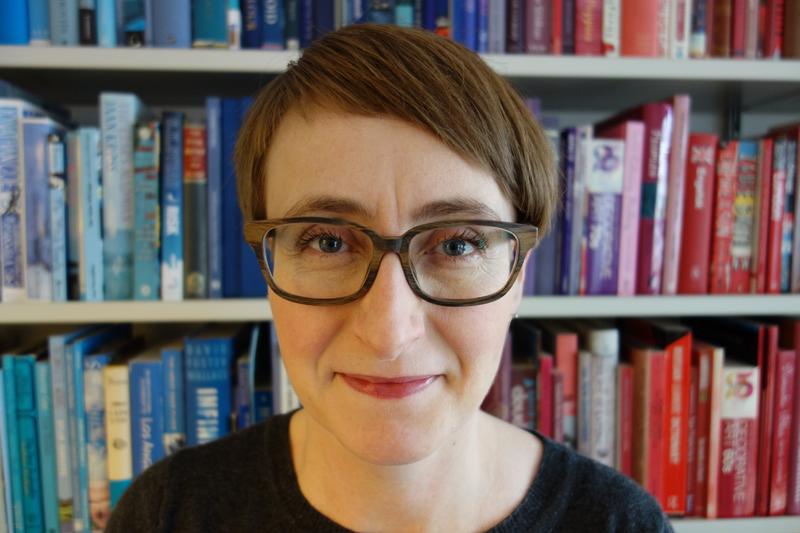Spotlight on Staff: Professor Rebecca Beasley

Which book has had the biggest impact on you?
I can’t name one—in fact, I refuse to! The books I read growing up were definitely the most formative. I knew from an early age the importance of escaping into the imagination, and I loved Enid Blyton’s Magic Faraway Tree books for that reason (especially the first one, The Enchanted Wood), though I’ve never re-read them as an adult. I even wrote a really pretentious letter to Julie Andrews about imaginative worlds, because she wrote another of my favourite books, The Last of the Really Great Whangdoodles, which my teacher Mrs Hickman read to my class when I was nine.
But I also have to mention Elinor M. Brent Dyer’s Chalet School books, all sixty-four of them: I wanted to be Jo Bettany, the schoolgirl who grew up to be a writer (though I wasn’t so keen on having eleven children like her), and because Chalet School girls had to speak French, German, and English on alternate days I became an enthusiastic learner of other languages (though nowhere near as proficient as the Chalet School girls). Finally, a more grown-up book: The New Oxford Book of English Verse, edited by Helen Gardner. I won a prize at school and this is the book I chose—I loved it and read almost everything in it again and again.
What do you do in your spare time?
Read (of course), go to art galleries, garden, learn Danish, and—less often than I’d like—go to Lucky Voice for very raucous karaoke with a group of not-to-be-named fellow academics.
Describe your ideal day.
No alarm clock; drink tea in bed with a book and my husband; find that exercise has been miraculously completed without me noticing; visit the Estorick Collection; buy a vintage Jonathan Saunders dress (Fall 2011 collection); have a martini (gin, dry, twist) at Bar Termini on Old Compton Street; eat dinner with family and friends at Spring. And/ or the aforementioned karaoke.
If you could live anywhere in the world, where would that be?
I’m pretty happy in London. But New Zealand or Denmark would be very good too.
As a child, what did you want to be when you grew up?
An actor or a writer or a teacher.
Who had the greatest influence on you during your childhood?
My parents: education and health were highly valued in our household. My father was a secondary school English teacher, my mother was a nurse.
Who were your childhood heroes?
I loved watching old films when I was growing up (6pm on BBC 2) and I especially loved anything with Fred Astaire, Judy Garland, Rita Hayworth, or Katharine Hepburn. A somewhat different hero was Gerald Durrell (as depicted at age ten in My Family and Other Animals). I can’t not mention Jarvis Cocker, to whom I gave a poem with my phone number on it in 1997 (OK, not really a child then). I have to agree with Marion Turner in her answer to this question that Torvill and Dean were very important to Brits of our generation (Britain won something!), though I can’t imagine why she didn’t also mention Buck’s Fizz for winning the Eurovision Song Contest in 1981. Also: Tony Hart!
What teacher had the greatest impact on you?
Again, I can’t name just one! At Romsey School, David Kessell and Richard Skinner who instilled ambition in a shy student. At Peter Symonds Sixth Form, Janice Oram and Chris Cooper who taught me literary depth and breadth respectively. At Cambridge, Tamara Follini, Juliet Dusinberre, Anne Fernihough, Clive Wilmer, and Richard Gooder—impossible to summarise the many things they taught me about reading, writing and teaching, but I still draw on all of it every day. At Berkeley, Thom Gunn, Jeannene Przblyski, Judith Butler, and Alex Zwerdling who between them enabled me to see what kind of doctoral thesis I might be able to write. But above all, my father, who taught me to read in the first place.
Do you have pets?
I wish.
Were you popular as a teenager?
Not when it came to picking teams in PE.
What is your favourite music?
John Adams, The Beatles, Aldous Harding, Anna Meredith, Pulp, Steve Reich. A whole lot of ‘90s pop, of course. And Maxime Le Forestier: my sixth form French teacher, Andy Stables, gave us all a mix-tape of his songs. I later found out that Mr Stables had been taught by Derek Attridge during his French and English degree at Southampton, and Derek has exactly the same mix, scratchy bits and all.
If you could have dinner with five famous people from history, who would they be?
Well, given that I like my dinner parties to be harmonious, I think I’d go for a group of Tolstoyans I’d love to meet: Lev Tolstoy himself, of course, who doesn’t count because he’s guest of honour and maybe we’re even having dinner at his country estate, and the actual guests would be Mahatma Gandhi, William Morris, Charles Daniel, Florence Worland, and Dorothy Richardson.
If you weren’t a member of the English Faculty, what would you be?
A member of another English faculty, I hope.
Rebecca Beasley is Professor of Modernist Studies and a Fellow in English at The Queen’s College. Her most recent book is Russomania: Russian Culture and the Creation of British Modernism, 1881-1922 (Oxford University Press, 2020), which won the British Association for Slavonic & East European Studies Women’s Forum Prize.



